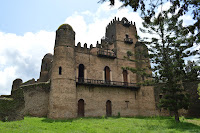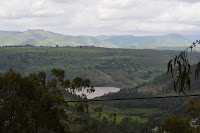
What an honour for Ethiopia to hold The First FIGO Africa Regional Conference! The organisation was excellent - there was no "African Time" here!! The sessions were extremely well coordinated. If I had one complaint it would be that there was too much going on - with 4-5 sessions running concurrently so it made it difficult to decide which sessions to go to.
The current president of FIGO Africa was present and very proud of his country (Ethiopia) and the whole conference.
The president of FIGO Prof Arulkumaran was heavily involved and very supportive of the conference.
The RCOG held some very well received sessions which really shows how committed they are to assisting Developing Countries to improve maternal mortality internationally.
 |
| Prof Walker |
Prof Walker (Sen Vice Pres International -2013) ran two successful workshops about how the well established guidelines of the RCOG can be easily adapted to be used in Developing Countries. The created lively debate amongst the delegates attending the workshop but did culminate in a general agreement that when starting to create protocols and guidelines it is definitely easier to adapt established evidence based guidelines than to start from scratch.

The RCOG had a session chaired by Alison Wright on what the RCOG can offer Healthcare Institutions and Individuals outside the UK.
http://www.rcog.org.uk/international

Paul Fogarty (Sen Vice Pres Global Health) spoke about the Global Issues that the RCOG was involved in and the benefits of overseas members - the picture shows the number of countries the RCOG already plays a part in.

Paul Wood spoke about the importance of a robust training and education scheme and how the MRCOG exam can be a very important milestone not only in the UK trainees career but also how important it can be for non-UK graduates to gain this very well recognised and respected qualification.
There was a great representation from members of the RCOG and UK based obstetricians including Lesley Regan, Hani Fawzi, Justin Konje, Alison Fiander, Isaac Manyonda, Austin Ugwamadu, Babatunde Gbolade and this is just a list of the ones that I knew/met!
The support from Lizzie Rafii-Tabar (Overseas), Lorraine Rossati (Director of Global Health RCOG) and Ann Tate (Director of Development RCOG) was superb throughout the whole conference.
And the session ended with Dr Sophia explaining why she is flying throughout Africa!! ...to raise awareness of the massive challenges African women have with access to healthcare and how much more likely they are to die in childbirth than their European Counterparts.
LIKE ON FACEBOOK for UPDATES - http://www.facebook.com/FlightForEveryMother
SEE MORE AT
http://www.flightforeverymother.com
http://www.blogflightforeverymother.com
 The smallest ambulance you ever may see!! They say it attaches onto the Bajaj (tuktuk) - would not fancy it though along the bumpy road - being in a 4x4 was bad enough!
The smallest ambulance you ever may see!! They say it attaches onto the Bajaj (tuktuk) - would not fancy it though along the bumpy road - being in a 4x4 was bad enough! 

















































